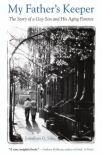My Father's Keeper: The Story of a Gay Son and His Aging Parents, Jonathan Silin [uplifting novels .TXT] 📗

- Author: Jonathan Silin
Book online «My Father's Keeper: The Story of a Gay Son and His Aging Parents, Jonathan Silin [uplifting novels .TXT] 📗». Author Jonathan Silin
One moment stands out. I am seated at a table pretending to read a new book that my second-grade teacher had enthusiastically given me a few days earlier. It is illustrated with gaudy pastel colors and has the toxic smell of fresh ink. The story involves some popular cartoon characters of the day that I have absolutely no interest in. Not even the active commerce in comics among my brother’s friends—and I do eye their collections with envy—has seduced me into reading about m y fat h e r ’ s k e e p e r n 73
imaginary animals or people. My own overactive fantasy life, crowded with figures from the real world, has no space for these intruders created by the pens of Walt Disney and the like. I turn the pages every few minutes hoping to appear gainfully employed.
Lucy Pringle, a tall, thin woman in her twenties, circulates through the room that contains just a handful of students. She is a new, well-meaning teacher, as my mother explains to me on several occasions, trying to secure my fuller cooperation in Lucy’s attempts to teach me to read. But good intentions aren’t enough to win my confidence or that of the small band of defiant second graders who I hang out with. We never miss an opportunity to take advantage of her in-experience.
Now Lucy leans over me with her prominent nose, receding chin, and black-framed eyeglasses, and asks me to read aloud. I stumble over every word with more than three letters and cannot answer the questions that she poses about the story. This encounter, in which the novice teacher who cannot control the class meets the novice reader unable to decipher the words on the page, is indelibly etched in my mind. It is a painful moment of truth in which my ignorance, as well as an abiding sense of shame, is unmasked. I am far too young to understand that it is also the failure of the school—to meet my needs as a learner—that is revealed.
As an adult I carry this moment with me as I visit classrooms today and imagine myself a “classified” child. Here I see many children who have been tested prior to entering kindergarten and found to have learning difficulties. Early in the year teachers must design an IEP (individual education plan) for them, which is then filed with the vice principal. A list of the classified children is posted at the entrance to the classroom for anyone to read. There are three to seven such children in each of the kindergartens that I regularly visit, and it is expected that the teachers will implement the plans without additional help.
Fortunately, my confrontation with Lucy Pringle took place long ago, in a small school where teachers had the time to bolster the 74 n jonathan g. silin
strengths of their students as well as to attend to their weaknesses. Despite my reading deficiencies, there were many other arenas in which I could experience success. I recall the pride we took in the rabbit cage we constructed from an old table and some chicken wire in first grade, the feel of the saw dust compound from which we modeled the con-tours of our second-grade map of New Amsterdam, and the smell of the paint that I carefully applied to the upper reaches of the cinder block wall just outside our fourth-grade classroom. That mural of the westward expansion remained long after I became a teacher in the very same school.
Miraculously, I acquire a few more reading skills by fifth grade, even though I seldom have the desire to open a book. My continuing lack of interest is now revealed during our Thursday morning trips to the school library. I am always anxious and at loose ends during these sessions. A short, gray-haired woman with a quick temper, bad teeth, and smoker’s breath, the librarian is a ten-year-old’s idea of the perfect witch. Each week she impatiently questions me about my interests to hasten the selection of a book. But I have no ability to name my interests and therefore assume that I have none. “How can you not have any interests?” she demands incredulously. A person of no interests, an uninteresting person, I am mortified by this inquisition.
Never doing well under pressure, I settle on a Hardy Boys mystery, consciously attracted by the cover drawing of the two friends and unconsciously drawn by the promise of scenes depicting illicit intimacy between them. Will they have a sleepover and be forced to share the same bed? Will they unexpectedly end up at the town swimming hole without their bathing suits? When a quick scouting foray into the text yields none of the desired moments, I disappointedly check it out anyway. During the week, I read so slowly and unenthusiastically that I cannot remember the plot, let alone finish the book.
Until I enter high school and begin to receive letter grades, I think I am very stupid, at least when it comes to academic matters. Then writing rather than reading becomes the terrain of interpersonal m y fat h e r ’ s k e e p e r n 75
struggle and the one on which I feel most inadequate. My grammar and syntax are awkward, my paragraphs filled with non sequiturs and my spelling unrecognizable. Nightly responsibility for editing my papers alternates between my mother and my father, the former far more patient and the latter always insistent that I understand the principles underlying his corrections. I am impatient, easily frustrated, and unwilling to internalize the lessons they struggle to teach me. In the





Comments (0)